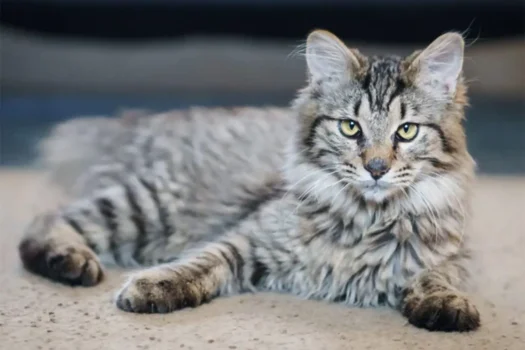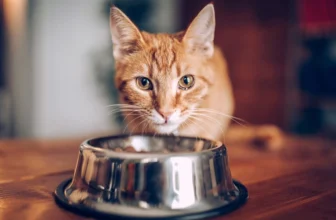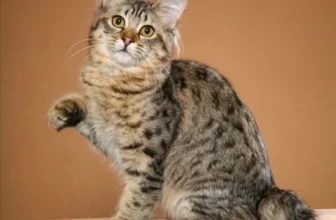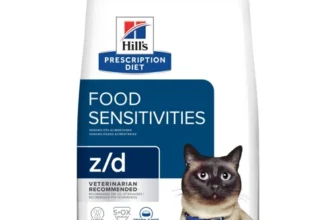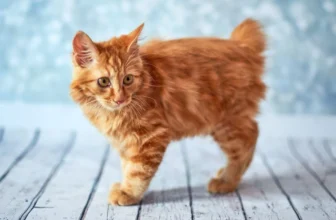As pet owners, we always strive to ensure our feline friends are healthy and happy. However, despite our best efforts, American Bobtail cats can experience gastrointestinal issues that can be pretty difficult to deal with. One of the leading causes of these problems is food allergies. Food allergies can trigger a range of symptoms that are discomforting for our furry friends. In this article, we explore the link between food allergies and gastrointestinal issues in American Bobtail cats, the common symptoms, and effective ways of managing them. So, let’s dive in and learn more about our feline friend’s digestive system.
Understanding the American Bobtail Cat’s Digestive System
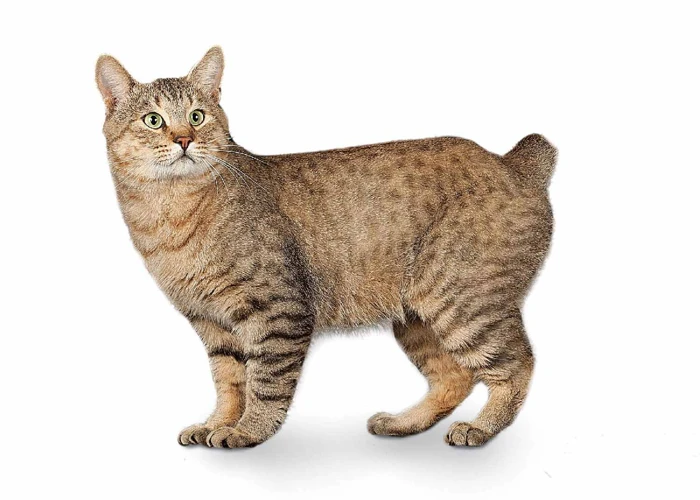
As a cat owner, it is essential to understand your pet’s digestive system to provide them with adequate care and treatment. The American Bobtail cat is an exceptionally active and playful breed, but they are also prone to several gastrointestinal issues that can affect their overall health and well-being. By understanding the key components of their digestive system, you can take steps to prevent and treat any digestive problems that may arise. To learn more about food allergies and related issues in American Bobtail cats, continue reading or check out our article on food allergies in American Bobtail cats.
Key Components of the Digestive System
The American Bobtail cat’s digestive system is an essential part of their overall health and well-being. Understanding the key components of their digestive system is critical for identifying potential problems that can lead to serious health issues.
The digestive system of the American Bobtail cat comprises several key components that work together to break down food and absorb nutrients. These key components include the mouth, esophagus, stomach, small intestine, large intestine, rectum, and anus.
The mouth serves as the entry point of food into the digestive system. The saliva produced in the mouth helps to break down food and begins the digestion process. Once swallowed, the food travels down the esophagus into the stomach.
The stomach is where food is further broken down by stomach acid and digestive enzymes. The digested food then passes into the small intestine where it is absorbed into the bloodstream. The small intestine is divided into three parts: the duodenum, jejunum, and ileum.
The large intestine or colon is responsible for absorbing water and electrolytes from the remaining undigested food matter. The rectum stores feces until it can be expelled through the anus.
It is crucial to note that any problem that arises with these key components of the digestive system can interfere with the cat’s digestive process. American Bobtail cats can suffer from various digestive issues such as food allergies, gastrointestinal issues, and other related conditions that can be life-threatening.
Understanding the American Bobtail cat’s digestive system provides an important foundation for tackling potential digestive problems. Regularly monitoring your cat’s food intake, cat food allergies, and watchful observation of their digestive health can help you identify issues early on. Feeding your cat with hypoallergenic cat food and alternative protein sources, as well as implementing elimination diets can be effective ways to keep your cat’s digestive system healthy.
For more information on alternative protein sources for American Bobtail cats suffering from allergies, please visit our article about it. Additionally, check out top hypoallergenic cat food brands for American Bobtail cats, and learn how elimination diets can help manage digestive issues in American Bobtail cats.
Food Allergies in American Bobtail Cats
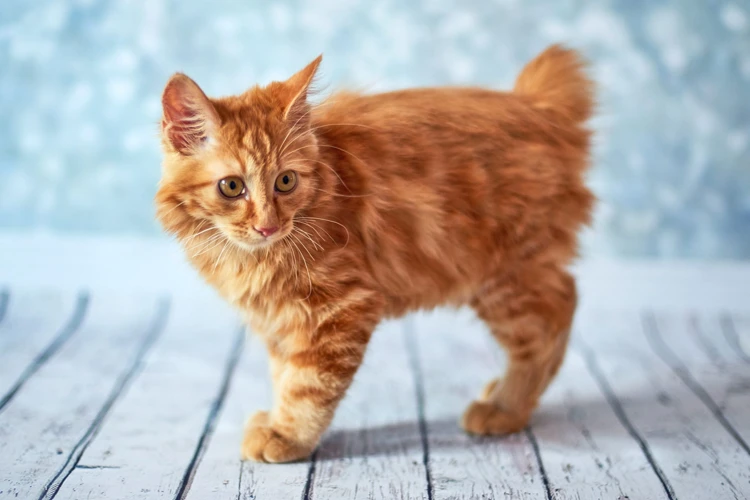
Feeding our furry friends with a healthy and balanced diet is essential for their overall well-being. However, just like humans, American Bobtail cats can suffer from food allergies, which can be a struggle for both the pet and the owner. Not being able to pinpoint the cause of their discomfort can be frustrating and often results in neglecting the problem altogether. Let us dive deeper into the intricacies of food allergies in American Bobtail cats, its possible causes, common symptoms, and how to diagnose them.
Causes of Food Allergies in American Bobtail Cats
Food allergies in American Bobtail cats can be caused by various factors. Some of these are:
- Protein sources: Cats are obligate carnivores, which means that they require a diet that is high in animal protein. Sometimes, cats may develop an allergy to a certain type of protein in their diet, such as chicken, beef, or fish. This can be due to overexposure to the protein or an inherent sensitivity to it.
- Additives: Some cats may develop an allergy to certain additives that are commonly used in cat food, such as food coloring, preservatives, or flavor enhancers. These additives can cause a severe allergic reaction in sensitive cats, leading to gastrointestinal issues.
- Food intolerances: Not all digestive issues in cats are caused by allergies. Some cats may have a food intolerance, which is characterized by difficulty in digesting certain types of food. For example, some cats may have trouble digesting lactose, a sugar found in dairy products.
- Environmental factors: Environmental factors such as pollen, dust, or mold spores can trigger an allergic reaction in cats. This type of allergy is known as atopy and is relatively rare in cats, but it can still occur.
Identifying the cause of a food allergy in your American Bobtail cat can be challenging. Working closely with your veterinarian can help determine the underlying cause of your cat’s allergy and provide the best course of action.
Common Symptoms of Food Allergies in American Bobtail Cats
Identifying food allergies in American Bobtail cats can be a daunting task for any pet owner. The symptoms can be varied and sometimes subtle. Here are some of the most common signs that your American Bobtail cat may be suffering from a food allergy:
- Itching and scratching: This is one of the most common symptoms of a food allergy in cats. Excessive licking, biting and scratching can indicate that your American Bobtail is allergic to a particular food item.
- Ear infections: Food allergies can also cause ear infections in American Bobtail cats. If your cat has recurrent ear infections, it is a good idea to talk to your vet about the possibility of a food allergy.
- Vomiting: If your American Bobtail frequently vomits, especially after eating, it could be a sign of a food allergy. This could happen immediately after eating or within a few hours of consuming the allergen.
- Diarrhea: Digestive problems like diarrhea and loose stools are common symptoms of food allergies in American Bobtail cats. The stools may be abnormal, runny or contain mucus.
- Chronic inflammatory skin conditions: If your American Bobtail is constantly licking or biting at its skin, it could indicate an allergic reaction to food. Skin rashes, redness, and bumps are also common signs that your cat may be allergic to a particular food.
If you notice any of these symptoms in your American Bobtail cat, it is essential to seek veterinary assistance promptly. Your vet can carry out further tests, including food trials or blood tests, to diagnose the problem accurately. Once diagnosed, you can work with your vet to develop a plan to manage your cat’s food allergies effectively.
Diagnosing Food Allergies in American Bobtail Cats
Diagnosing food allergies in American Bobtail cats can be a tricky process, as the symptoms of food allergies can often mimic those of other conditions. However, with persistence and the help of a knowledgeable vet, a diagnosis can be reached.
Elimination Diet: The best way to diagnose a food allergy is through an elimination diet. This involves feeding the cat a specially formulated hypoallergenic diet that is free from common allergens such as chicken, beef, and fish. This food is typically fed for 8-12 weeks, during which time the cat’s symptoms should begin to improve if a food allergy is to blame.
Food Trial: Once the symptoms have improved, the cat is typically switched back to their original diet to see if the symptoms return. If they do, then the cat is likely allergic to an ingredient in their original diet.
Blood Tests: Some vets may recommend a blood test to check for elevated levels of immunoglobulin E (IgE), which is often present in cats with food allergies. However, these tests can be unreliable and a negative result does not necessarily mean the cat is not allergic to a particular food.
Skin Tests: Skin tests, where a small amount of food is injected under the skin, can also be done to check for an allergic reaction. However, these tests can be expensive and are not always accurate.
Elimination diets are the most effective method for diagnosing food allergies in American Bobtail cats. It is important to work closely with a vet to ensure the correct diagnosis and treatment plan is put in place.
| Diagnosing Food Allergies in American Bobtail Cats |
| 1. Elimination Diet |
| 2. Food Trial |
| 3. Blood Tests |
| 4. Skin Tests |
Gastrointestinal Issues in American Bobtail Cats
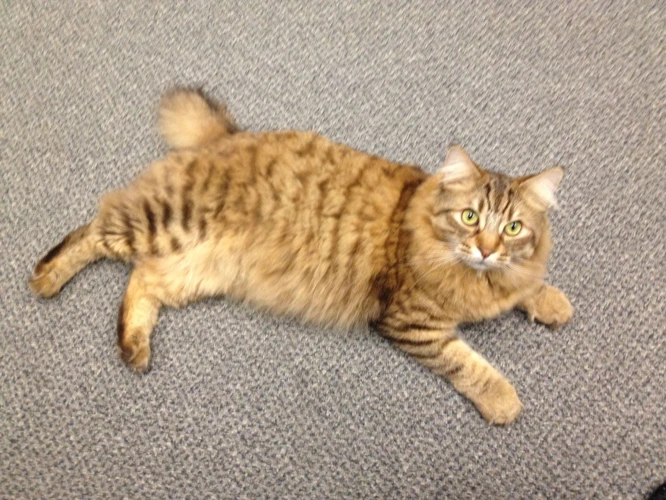
Cats, including American Bobtails, are known to be finicky eaters, and gastrointestinal issues are not uncommon among them. The American Bobtail cat’s digestive system is complex, consisting of several key components that work in tandem to break down food, extract necessary nutrients and discard waste. Unfortunately, this system is not infallible and can be disrupted by several factors. In this section, we will explore the causes, symptoms, and diagnosing of gastrointestinal issues in American Bobtail cats.
Causes of Gastrointestinal Issues in American Bobtail Cats
Gastrointestinal issues in American Bobtail cats can have a range of causes, from dietary changes to underlying medical conditions. Here are some of the most common causes of GI issues in American Bobtail cats:
| Cause | Explanation |
|---|---|
| Dietary Changes: | Switching to a new type of food too quickly or suddenly can cause diarrhea or vomiting. Feeding table scraps or foods high in fat can also cause GI issues. |
| Bacterial or Viral Infections: | American Bobtail cats can contract bacterial or viral infections from contaminated food, water, or contact with other infected animals. |
| Parasites: | Internal parasites, such as roundworms or hookworms, can cause diarrhea, vomiting, and other GI issues in American Bobtail cats. External parasites, such as fleas or mites, can cause skin irritation and lead to excessive licking or scratching, which may also cause GI issues. |
| Inflammatory Bowel Disease (IBD): | IBD is a chronic condition that causes inflammation and irritation in the lining of the digestive tract. Symptoms may include diarrhea, vomiting, and decreased appetite. |
| Colitis: | Colitis is the inflammation of the colon and can result in diarrhea, straining during bowel movements, and abdominal pain in American Bobtail cats. |
| Pancreatitis: | Pancreatitis is the inflammation of the pancreas, which can cause vomiting, diarrhea, and abdominal pain in American Bobtail cats. |
It’s important to consult with your vet if your American Bobtail cat is exhibiting any signs of GI issues, as prompt attention can ensure successful treatment and recovery.
Common Symptoms of Gastrointestinal Issues in American Bobtail Cats
It can be difficult to determine if your American Bobtail cat is experiencing gastrointestinal issues. However, there are some common symptoms to look out for such as:
- Vomiting: This is one of the most apparent symptoms of gastrointestinal issues in cats. If your cat vomits frequently, experiences chronic vomiting, or vomits with blood, it may indicate gastrointestinal problems.
- Diarrhea: A sudden change in your cat’s bowel habits, such as an increase in frequency or looseness, could suggest gastrointestinal issues. Additionally, if you notice blood in your cat’s feces, it should be treated as an emergency.
- Lack of appetite: If your cat is not interested in its food, it may suggest gastrointestinal discomfort. It could be due to nausea, pain, or a general feeling of malaise caused by digestive problems.
- Lethargy: Gastrointestinal issues can make your cat lethargic or exhausted, leaving them less active and playful than usual.
- Weight loss: If your cat is losing weight despite eating the same amount of food, it could be due to gastrointestinal issues.
If you notice any of these symptoms in your American Bobtail cat, it’s essential to seek veterinary help immediately. Early recognition, diagnosis, and treatment can prevent the condition from progressing and can help your cat stay healthy and happy for a long time.
Diagnosing Gastrointestinal Issues in American Bobtail Cats
When it comes to diagnosing gastrointestinal (GI) issues in American Bobtail cats, there are several steps that a veterinarian will usually take. These steps may include:
1. Physical Exam: The veterinarian may perform a physical exam to assess the cat’s overall health and look for any obvious signs of GI issues, such as abdominal pain or bloating.
2. Blood Work: Blood tests can help determine whether there are any abnormalities in the cat’s blood cells or organ function that could be related to GI issues.
3. Fecal Analysis: A fecal analysis can reveal whether there are any parasites or bacteria in the cat’s digestive system that could be causing GI issues.
4. Imaging Tests: Imaging tests such as X-rays or ultrasound may be used to obtain a visual image of the cat’s digestive system and identify any abnormalities or blockages.
5. Endoscopy: In some cases, an endoscope may be used to view the inside of the cat’s digestive system and obtain a tissue sample for biopsy.
It’s important to note that GI issues can be difficult to diagnose in cats, as they may not always exhibit clear symptoms. It’s crucial to seek veterinary care if your American Bobtail cat displays any signs of digestive distress, such as vomiting, diarrhea, or decreased appetite. Early diagnosis and treatment can help prevent further complications and improve your cat’s overall health and well-being.
How Food Allergies Lead to Gastrointestinal Issues in American Bobtail Cats
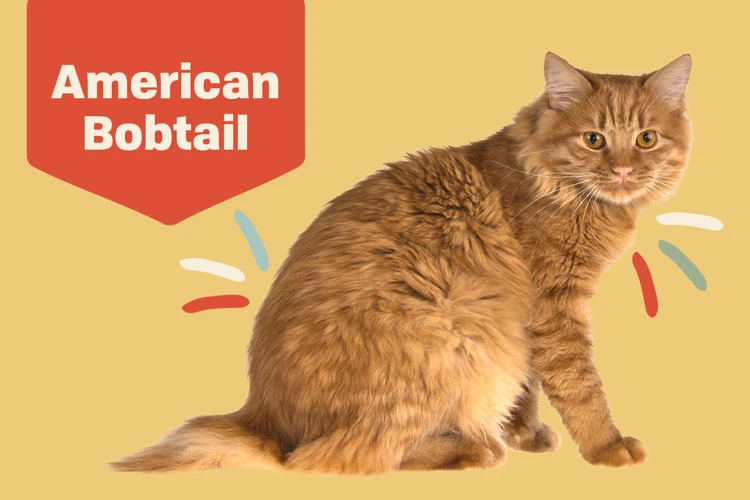
Food allergies and gastrointestinal issues are often interconnected in American Bobtail cats. When a cat has a food allergy, their immune system overreacts to a specific protein in their food, mistaking it as a harmful invader. This triggers an inflammatory response, which can cause various gastrointestinal problems.
Inflammation: Inflammation caused by food allergies can affect the lining of the gastrointestinal tract in American Bobtail cats, causing damage to the intestines and disrupting their ability to absorb nutrients. This can lead to malnutrition and weight loss.
Increased mucus production: Food allergies can also increase mucus production in the gastrointestinal tract, which can lead to vomiting, diarrhea, and constipation in American Bobtail cats. The increased mucus can also interfere with nutrient absorption and cause inflammation.
Bacterial imbalance: Food allergies can disrupt the balance of good and bad bacteria in the gut of American Bobtail cats. When the balance is disrupted, harmful bacteria can proliferate and cause gastrointestinal issues, including diarrhea, constipation, and inflammatory bowel disease.
Secondary infections: Food allergies can also weaken the immune system of American Bobtail cats, making them more susceptible to secondary bacterial or viral infections. These secondary infections can further worsen gastrointestinal symptoms and lead to other health problems in the long run.
Anxiety and stress: Food allergies can also affect the behavior of American Bobtail cats, making them anxious and stressed. This can trigger a stress response in the body, which can make gastrointestinal symptoms worse.
Food allergies can trigger inflammation, bacterial imbalance, and other changes in the gut of American Bobtail cats that can lead to a wide range of gastrointestinal issues. It is crucial to identify and manage food allergies in cats to avoid long-term health problems caused by chronic inflammation and digestive issues.
Managing Food Allergies and Gastrointestinal Issues in American Bobtail Cats
As a cat owner, managing your American Bobtail’s food allergies and gastrointestinal issues can be quite challenging. It requires careful understanding of their health condition and a comprehensive plan for their diet, medication as well as natural supplements. But with the right approach, you can help your feline friend live a healthy and happy life. Let’s explore some effective ways of managing food allergies and gastrointestinal issues in American Bobtail Cats.
Elimination Diets and Food Trials
Elimination Diets and Food Trials
If a food allergy is suspected in an American Bobtail cat, an elimination diet trial is often the first step. This involves the removal of all potential allergens from the cat’s diet and then reintroducing them one at a time to identify which food(s) the cat is reacting to.
An elimination diet trial requires strict adherence to the diet plan and can take several weeks or even months. During this time, the cat must only eat a specific protein source and carbohydrate source that they have never eaten before. These novel proteins and carbohydrates are less likely to trigger an allergic reaction.
Below is a table of potential novel protein sources to use in an elimination diet trial:
| Potential Novel Protein Sources | Potential Novel Carbohydrate Sources |
|---|---|
| Quail | Green peas |
| Kangaroo | Pumpkin |
| Pheasant | Chickpeas |
| Ostrich | Sweet potato |
It’s important to note that during the elimination diet trial, the cat must not consume any other foods, including treats or table scraps. Even a small amount of the allergenic food can trigger a reaction, and the trial will need to start over.
If the cat’s symptoms improve during the elimination diet trial, then the suspected allergen can be slowly reintroduced to the diet to determine whether it is causing the reaction. If the cat’s symptoms return, the food should be removed from their diet permanently.
Food Trials
Once a food allergen has been identified, a food trial can help determine if the cat can tolerate small amounts of the allergenic food or if it needs to be completely removed from their diet. During a food trial, the cat is fed small amounts of the allergenic food to see if they tolerate it without exhibiting symptoms. A food trial involves close monitoring of the cat’s symptoms and requires several weeks to months to complete.
It’s important to note that elimination diets and food trials should only be conducted under the guidance of a veterinarian. They can help determine which novel protein and carbohydrate sources to use and monitor the cat’s symptoms throughout the trial. If you suspect that your American Bobtail cat has a food allergy, it’s important to seek veterinary care promptly.
Common Medications for Food Allergies and Gastrointestinal Issues in American Bobtail Cats
When it comes to managing food allergies and gastrointestinal issues in American Bobtail cats, medications can play an important role in their treatment. Your veterinarian will prescribe medications based on the severity of their symptoms and underlying condition.
Below is a table of common medications for food allergies and gastrointestinal issues in American Bobtail cats:
| Medication | Function | Side Effects |
|---|---|---|
| Corticosteroids (prednisone, methylprednisolone) | Reduce inflammation and relieve itching | Increased thirst and appetite, weight gain, increased risk of infection, increased risk of diabetes if used long-term |
| Antibiotics (amoxicillin, metronidazole) | Treat bacterial infections that can exacerbate gastrointestinal symptoms | Upset stomach, diarrhea, vomiting, allergic reactions |
| Antidiarrheals (loperamide, bismuth subsalicylate) | Reduce diarrhea and associated discomfort | Constipation, nausea, abdominal pain, dizziness |
| Antiemetics (ondansetron, maropitant) | Control vomiting and prevent dehydration | Drowsiness, constipation, decreased appetite |
It’s important to note that medication alone can’t cure food allergies or gastrointestinal issues in American Bobtail cats. They should be used in conjunction with a special diet and other treatment options as recommended by your veterinarian. It’s also important to keep a close eye on your cat for any potential side effects and report them to your veterinarian immediately.
Probiotics and Other Natural Supplements for Gastrointestinal Health in American Bobtail Cats
To maintain the overall gastrointestinal health of American Bobtail cats, owners should consider supplementing their pet’s diet with probiotics and other natural remedies. Probiotics are live bacteria and yeast that are beneficial to the digestive system. They help to promote a healthy balance of gut bacteria and prevent the growth of harmful bacteria that can cause gastrointestinal issues.
Probiotics
Probiotics can be found in a variety of forms, including powder, capsules, and treats. Some popular probiotic strains to look for include Lactobacillus acidophilus, Bifidobacterium animalis, and Streptococcus thermophilus. These strains have been shown to improve digestive health by reducing inflammation, enhancing nutrient absorption, and regulating bowel movements.
Pumpkin
Another natural remedy that can benefit the gastrointestinal health of American Bobtail cats is pumpkin. Pumpkin is an excellent source of fiber, which can help regulate bowel movements and prevent constipation. It also contains antioxidants and other nutrients that support overall digestive health.
Marshmallow Root
Marshmallow root is another natural supplement that cat owners may consider giving their pets. This herb has anti-inflammatory and anti-irritant properties and can soothe the digestive tract. It is especially beneficial for cats who have been experiencing chronic diarrhea or vomiting.
Slippery Elm
Slippery elm is another herb that can help soothe inflammation in the digestive tract. It contains mucilage, a substance that coats and protects the lining of the gut, reducing irritation caused by food allergens or other irritants. Slippery elm can also improve nutrient absorption, making it a useful supplement for cats with chronic diarrhea or malabsorption issues.
When selecting natural supplements for their pets, owners should always consult with a veterinarian. While natural remedies can be effective in promoting gastrointestinal health, they may not be suitable for every cat. The vet can recommend the most appropriate and effective supplements based on the individual health needs of each American Bobtail.
Conclusion
In conclusion, it is important for American Bobtail cat owners to be aware of the link between food allergies and gastrointestinal issues in their pets. Understanding the digestive system of these cats and the causes and symptoms of food allergies and GI issues is crucial for proper diagnosis and treatment.
If you suspect that your American Bobtail cat is suffering from food allergies or GI issues, it is important to seek veterinary attention as soon as possible. Diagnosis may involve blood tests, ultrasounds, or other diagnostic procedures to confirm the underlying cause of the problem.
Treatment options for food allergies and GI issues in American Bobtail cats may include special diets, medications, and probiotics. Elimination diets and food trials can help identify specific allergens causing the reactions, while medications can help alleviate symptoms such as vomiting and diarrhea. Probiotics and other natural supplements can also be used to promote gastrointestinal health and prevent future issues.
Overall, the key to managing food allergies and GI issues in American Bobtail cats is prompt and accurate diagnosis, followed by appropriate treatment and ongoing management under the guidance of a veterinarian. By taking a proactive approach to their cat’s health, owners can help ensure their pet leads a healthy, happy life for years to come.
Frequently Asked Questions
Can American Bobtail cats develop food allergies?
Yes, American Bobtail cats can develop food allergies just like any other cat breed. In fact, food allergies are becoming increasingly common in cats.
What are some common symptoms of food allergies in American Bobtail cats?
Common symptoms of food allergies in American Bobtail cats include vomiting, diarrhea, itchy skin, hair loss, and ear infections.
How are food allergies diagnosed in American Bobtail cats?
Food allergies in American Bobtail cats are diagnosed through a process of elimination. This involves putting the cat on an elimination diet and then slowly reintroducing foods to determine which ones are causing the allergic reaction.
What are some common causes of gastrointestinal issues in American Bobtail cats?
Common causes of gastrointestinal issues in American Bobtail cats include dietary indiscretion, bacterial or viral infections, stress, and intestinal parasites.
What are some common symptoms of gastrointestinal issues in American Bobtail cats?
Common symptoms of gastrointestinal issues in American Bobtail cats include vomiting, diarrhea, loss of appetite, abdominal pain, and dehydration.
How are gastrointestinal issues diagnosed in American Bobtail cats?
Gastrointestinal issues in American Bobtail cats are diagnosed through a combination of physical exams, blood tests, fecal exams, and imaging tests such as x-rays or ultrasound.
How do food allergies lead to gastrointestinal issues in American Bobtail cats?
Food allergies can lead to gastrointestinal issues in American Bobtail cats because when the cat eats a food it is allergic to, it can irritate the lining of their digestive tract causing inflammation, vomiting, and diarrhea.
What is an elimination diet?
An elimination diet is a process of removing certain foods from a cat’s diet in order to determine if they are allergic to any of those foods. The cat is then put on a diet of hypoallergenic food until symptoms resolve, and then slowly reintroduced to certain foods one at a time to determine which foods they are allergic to.
What are some common medications used to treat food allergies and gastrointestinal issues in American Bobtail cats?
Common medications used to treat food allergies and gastrointestinal issues in American Bobtail cats include corticosteroids to reduce inflammation, antibiotics to treat infections, and antiemetics to control vomiting.
What are probiotics and how can they help with gastrointestinal health in American Bobtail cats?
Probiotics are live bacteria and yeasts that are good for a cat’s digestive system. They can help improve gastrointestinal health by rebalancing the good bacteria in the cat’s gut, which can improve digestive function and reduce inflammation.

